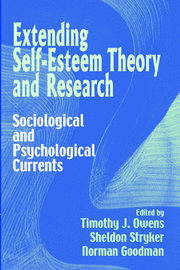Book contents
- Frontmatter
- Contents
- List of Contributors
- SECTION ONE THE FRAME
- SECTION TWO CONCEPTUAL AND METHODOLOGICAL ISSUES
- 3 Theorizing the Relationship Between Self-Esteem and Identity
- 4 Measuring Self-Esteem: Race, Ethnicity, and Gender Considered
- 5 The Self as a Social Force
- 6 Self-Certainty and Self-Esteem
- SECTION THREE SOCIAL AND LIFE COURSE CONTEXTS OF SELF-ESTEEM
- SECTION FOUR SELF-ESTEEM AND SOCIAL INEQUALITIES
- SECTION FIVE SELF-ESTEEM AND SOCIAL PROBLEMS
- Index
5 - The Self as a Social Force
Published online by Cambridge University Press: 24 November 2009
- Frontmatter
- Contents
- List of Contributors
- SECTION ONE THE FRAME
- SECTION TWO CONCEPTUAL AND METHODOLOGICAL ISSUES
- 3 Theorizing the Relationship Between Self-Esteem and Identity
- 4 Measuring Self-Esteem: Race, Ethnicity, and Gender Considered
- 5 The Self as a Social Force
- 6 Self-Certainty and Self-Esteem
- SECTION THREE SOCIAL AND LIFE COURSE CONTEXTS OF SELF-ESTEEM
- SECTION FOUR SELF-ESTEEM AND SOCIAL INEQUALITIES
- SECTION FIVE SELF-ESTEEM AND SOCIAL PROBLEMS
- Index
Summary
Most of our attention in studying the self has been on the self-concept as a product of social forces and influences. This is understandable since the self and self-concept are products of the social environment. People are not born with selves. Rather, selves emerge out of social and symbolic interaction. And it is important to understand the social processes and factors involved in the development of the self and its various components. In fact, Morris Rosenberg has been a major contributor to this focus, adding substantially to our understanding of the principles of self-concept formation and revealing their operation within various social contexts.
Yet Rosenberg also urged us to go beyond our predominant concern with the antecedents of self-concept, toward greater consideration of the self as a social force in its environment. He observed that “one reason for past neglect (of viewing the self as a social force) … is that students of social structure and personality have focused overwhelmingly on the impact of society on personality and neglected the impact of personality on society” (Rosenberg, 1981, p. 623). This neglect is also a function of the related tendency within sociology (and much of social psychology) to look for external causes of individual experience and behavior – in the social situation, social institutions, or more distant social structures and cultural systems. We are much less likely to look to the self as a source of agency and motivation, affecting its environment as well as contributing to its own development.
- Type
- Chapter
- Information
- Extending Self-Esteem Theory and ResearchSociological and Psychological Currents, pp. 85 - 100Publisher: Cambridge University PressPrint publication year: 2001
- 20
- Cited by

